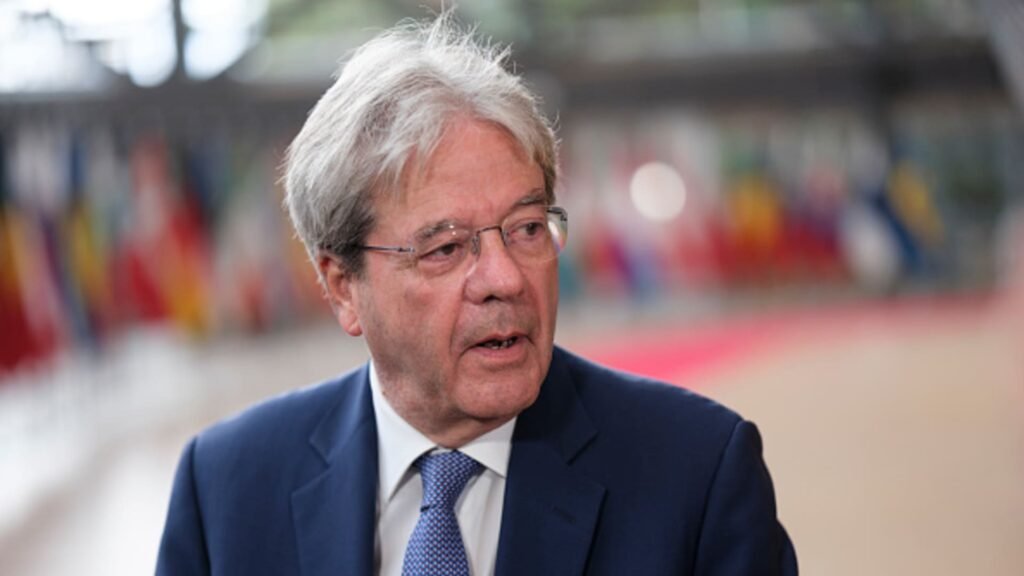
The European Union has successfully avoided the “dire prophecies” that have threatened its economy in recent years but still must contend with Russia’s war in Ukraine and unstable trade relations with China, outgoing European Commissioner for Economic Affairs Paolo Gentiloni said on Saturday.
Speaking to CNBC’s Steve Sedgwick at the Ambrosetti Forum in Cernobbio, Italy, on Lake Como, Gentiloni said the European Union’s economy “has had weak growth overall, but none of the dire predictions of recession, blackouts, fragmentation, the fragmentation of Europe in the face of Russian aggression that we’ve heard over the last two or three years have happened.”
Gentiloni, a former Italian prime minister, has been European Commissioner for Economic Affairs under European Commission President Ursula von der Leyen since December 2019. The Commission is responsible for drafting economic strategies and tariffs and other legislation for the 20 eurozone countries, while the European Central Bank oversees the region’s monetary policy and interest rate decisions.
Following von der Leyen’s eventful re-election, Gentiloni will not return for a second term as commissioner, but he did lay out the economic situation awaiting his soon-to-be successor.
“The economy is growing, albeit slowly, and the risks of divergence within the European Union, which were very high when the pandemic hit, are very limited,” he noted. “The bad news is that if we don’t increase our capabilities in terms of competitiveness, if we don’t make significant progress in what we call capital markets union, if we don’t address the defense challenge… the new global situation will be very tough for Europeans.”
As Europe recovers from the COVID-19 pandemic, it is battling a high cost of living and a high inflationary environment exacerbated by tight energy supplies following Russia’s invasion of Ukraine in February 2022 and sanctions against Moscow. The eurozone economy has expanded in the first half of the year, with preliminary figures showing gross domestic product (GDP) growth in the three months to the end of June at 0.3% compared to the previous quarter, beating expectations.
In its spring forecast, the European Commission projected that the EU’s GDP would grow 1% in 2024 and the euro area’s 0.8%, bringing growth rates for the two regions to 1.6% and 1.4%, respectively, in 2024. At the time, the Commission cautioned that growth was fueled by accelerating private consumption, falling inflation and a strong labor market, but also pointed to broader geopolitical risks amid continuing conflicts in Ukraine and the Middle East.

Amid falling inflation, the ECB eased monetary policy for the first time since 2019 in June, cutting the central bank’s benchmark interest rate to 3.75% from a record 4% until September 2023. As of Friday, markets were fully pricing in another ECB rate cut at its Sept. 12 meeting.
Relations with China
Going forward, Europe must weather the twin storms of a close election in the United States, its main trading partner, in November, and friction in trade relations with China. The EU has become a target for Beijing following its decision in June to impose higher tariffs on Chinese electric vehicle imports, alleging that the country “significantly benefits from unfair subsidies” and poses the “threat of economic harm” to European electric vehicle makers.
Gentiloni stressed on Saturday that trade diplomacy with China and the war in Ukraine should top the issues facing the new commission, calling them more pressing concerns than the possibility of a second U.S. administration under former President Donald Trump.
The European Union needs to “support Ukraine and keep the door open for international trade,” but it also needs to “abandon originality in trade relations with China.” However, this is because international trade and international trade rules are [are] “It’s over,” Gentiloni pointed out.
He downplayed the economic impact of a Trump victory in November, adding: “The change in US administration resulting from Trump’s election victory will of course not be welcomed in Brussels, but I don’t think it will lead to any major changes in terms of economic relations.”
Winds of change
Gentiloni has yet to announce what he plans to do after leaving the European Commission, as Europe and its legislative bodies face growing support from the far right.
“You shouldn’t plan your next role while you’re in your current role, but of course I will contribute to European affairs and probably to Italian politics and Italian affairs,” he said on Saturday.
The leftist politician is unlikely to win the support of Italian Prime Minister Giorgia Meloni, who has nominated European Affairs Minister Raffaele Fitto from his right-wing Brothers of Italy party to sit on the new EU executive.

The far-right has made substantial gains in recent European elections, and Viktor Orbán, the right-wing prime minister of Hungary, who currently holds the EU Council presidency, has questioned whether the establishment of the Van der Leyen Commission is appropriate given political sentiment.
“The crux of the matter is this: The previous commission proved very unsuccessful in terms of competitiveness, the European economy, immigration, preventing war. So, generally speaking, it was a failed commission,” the Hungarian leader told CNBC’s Sedgwick on Friday, noting that the decision was made to “establish essentially the same commission.”
He added: “So I [a] Great Faith [people] It will change and you will be able to perform better than before. [is is] That’s hard to see. So I try to support the committee as much as I can, but as a rational person, I think we ignored the desire of the electorate for change, and I think the same system is not going to work. [is] It still has its place in Brussels, and that’s not good.”

—CNBC’s Katrina Bishop contributed to this report.



